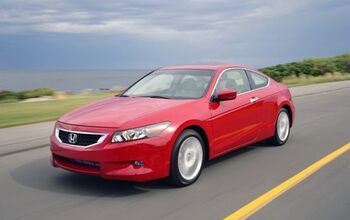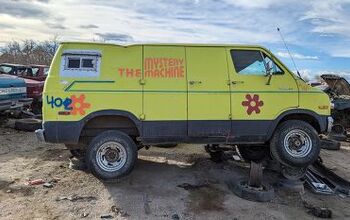Ford Death Watch 21: We're Number Three!
The average American car buyer is completely unaware of Ford’s financial troubles. They don’t know Alan Mulally from Bertie Ahern. They don’t know that Ford’s taken out The Mother of All Bank Loans, mortgaging everything up to and including the company logo. They don’t know the automaker’s got three years to avoid annihilation. But the day Toyota overtakes Ford as America’s number two carmaker, the U.S. consumer will get a multi-media wake-up call. The psychological damage will be profound. Not that Ford sees it that way.
“Our focus is on getting our business back on a solid footing to return to profitability,” George Pipas pronounced. “Any talk about sales ranking is little more than a distraction." That’s a strange comment coming from a man holding the title “Chief Sales Statistician, Ford Motor Company.” But Pipas has a point. Why worry about Toyota’s rise to the top when you’re fighting to stay alive?
Seven years ago, Dearborn’s Darlings were worth just over $80b. This year, Ford’s market cap stands at $13b. Although the company has topped-up its cash reserves with $26b of newly leveraged liquidity, it's set to toss $17b of that into the fire over the next three years. Will it be enough? Ford Flack Oscar Suris claims the more fully funded Blue Oval is perfectly positioned to handle the day-to-day challenges of being number three. Suris insists that neither a recession nor “any other event” (wind, sleet and snow?) could force the freshly flush Ford to flounder.
John Novak of Morningstar Inc., ain’t buying it. Like any sensible auto industry analyst, Novak insists that Ford’s survival depends entirely on its ability to generate cash through improved sales and profit ratios. Without a new cost-cutting UAW contract and substantial regrowth in its market share, Billy Ford's mob will be hard pressed to service the family firm's debt, never mind pay off the principal.
To keep the bankers at bay and the coffers at capacity, Ford is staking its short term future on the new Edge. The Blue Oval’s blitzing the American public with $100m in edgy Edge advertising. And why not? The sharp-looking crossover is FoMoCo's only shot at much-needed, long-overdue new product buzz. To add timbre to that tone, Dearborn is cranking up its marketing machine to new heights.
This latest advertising onslaught owes its genesis (genius?) to The Way Fordward Version 1.0. Flying in the face of all the badge-engineered inbreeding polluting the gene pool of Ford's extended family of products, the company has decided it’s all about "Brand DNA." They're going to (re)define their soon-to-be-decided number of divisions, create products that embody these new, more coherent brand values, and then sell the vehicles to people who, um, want them. The Edge campaign is designed to build on– OK, "initiate" this not-so-novel concept.
The Glass House Gang are pitching the cross border crossover in every conceivable medium, to every imaginable market, in every possible language (even “Spanglish”). Rolling Stone gets a centerfold, NBC’s Las Vegas gets product [out-of-]placement, urban skyscrapers get hallucinatory projections and Edmunds gets richer. Despite the ubiquity, Ford has some human DNA in its sights: single men and women in their mid-thirties with an active lifestyle (codenamed "Phil" and “Mia”).
Celebrities ranging from Korean soap star Ahn Jae Wook to Beyonce Knowles will pocket large checks to push their fan base over– I mean into an Edge. Ballers n’ playas tuning into to the Steve Harvey show will hear Grammy nominee Kelis’ (pronounced “Kuh-Leese”) musical campaign contribution: “Push it to the Edge.” Jeri Ward, Ford Edge Marketing Manager, sees the hip hop artist as “the perfect spokesperson for the urban Edge campaign… she has a bold style that breaks the rules.” Apparently, the lady whose milkshake brought all the boys to the yard “prefers bold designs.” So sending them to a Ford dealer should be a piece of cake.
Whether or not Phil, Mia and their hip-hop lovin' friends elevate the not-so-bling Ford Edge to stuntin' 'Sclade status, FoMoCo's crossover is sailing straight into a consumer headwind. The U.S. housing market is in its first full year decline since the Great Depression. After years of cash-on-the-hood and no interest loans for anyone with a pulse, the demand for new vehicle financing is drying up– even as Ford’s middle class mid-market buyer finds that expendable income is becoming as scarce as storage space on Ford dealers’ lots. Industry mavens CSM Worldwide predict that Billy's Boyz will bear the brunt of a nine-year, 16.2m unit low in auto sales.
In short, the Edge has got to sell while the selling’s good. The New York Times predicts that Toyota will scoop America's number two sales slot next February. On that fateful day, American car buyers will know something’s very wrong over at Ford. Tipping point or no, selling a Ford is about to get a LOT harder.
More by Neunelf
Latest Car Reviews
Read moreLatest Product Reviews
Read moreRecent Comments
- Probert They already have hybrids, but these won't ever be them as they are built on the modular E-GMP skateboard.
- Justin You guys still looking for that sportbak? I just saw one on the Facebook marketplace in Arizona
- 28-Cars-Later I cannot remember what happens now, but there are whiteblocks in this period which develop a "tick" like sound which indicates they are toast (maybe head gasket?). Ten or so years ago I looked at an '03 or '04 S60 (I forget why) and I brought my Volvo indy along to tell me if it was worth my time - it ticked and that's when I learned this. This XC90 is probably worth about $300 as it sits, not kidding, and it will cost you conservatively $2500 for an engine swap (all the ones I see on car-part.com have north of 130K miles starting at $1,100 and that's not including freight to a shop, shop labor, other internals to do such as timing belt while engine out etc).
- 28-Cars-Later Ford reported it lost $132,000 for each of its 10,000 electric vehicles sold in the first quarter of 2024, according to CNN. The sales were down 20 percent from the first quarter of 2023 and would “drag down earnings for the company overall.”The losses include “hundreds of millions being spent on research and development of the next generation of EVs for Ford. Those investments are years away from paying off.” [if they ever are recouped] Ford is the only major carmaker breaking out EV numbers by themselves. But other marques likely suffer similar losses. https://www.zerohedge.com/political/fords-120000-loss-vehicle-shows-california-ev-goals-are-impossible Given these facts, how did Tesla ever produce anything in volume let alone profit?
- AZFelix Let's forego all of this dilly-dallying with autonomous cars and cut right to the chase and the only real solution.


































Comments
Join the conversation
It is interesting to watch Toyota climb its way to the top. It is ironic that aside from the recent recalls, Toyota has not bothered to resolve its engine oil sludge problem. Instead of calling for an actual recall on these engines, it continues to blame the owners for poor maintenance. Toyota says the incidence of engine sludge is "rare", but owner reports do not indicate the same. Toyota has minimized the problem from day one. I have been in a rather unique position regarding this engine sludge malady. Over the course of six years, I have read thousands of Toyota owner accounts and compared notes. Toyota does not want to face the truth; it is hoping that the "sludge monster" fades away from public scrutiny. Indeed, there are some who are actively trying to cover up any on-going discussions of Toyota sludge. Some web sites that had thousands of posts on the issue have been hacked. Still, there are lots of Toyota owners looking for help when sludge has disabled their low mileage vehicles. Toyota itself stopped notifying the 3.3 million affected vehicle owners; many owners have revealed that they know nothing about the Customer Support Program for Engine Oil Gelation. Many of the Toyota dealerships aren't forthcoming with the information. My question is this...with so few places to go to find other similarly-affected vehicle owners, how does the public get a true sense for what is going on after the sale of the so-called "quality" vehicles? A company like Toyota has the economic means to shape public opinion about its products. Is this reality, though? Is Toyota perpetuating the myth about the high quality of its vehicles and actively working to subdue public criticism of its products? Many Toyota owners believe this is exactly what is happening. Many Toyota engine oil sludge victims have tried in vain to get Toyota's Customer Service corporate staff to honor the CSP. Toyota is making the vehicle owners jump through hoops to qualify for the repair coverage/reimbursement. This isn't what Toyota wants the public to know, though. Many Toyota owners have said that Toyota cares only about the bottom line. These same owners have endured frustration, inconvenience, and financial setback as a result of the sludge condition in their vehicles. These owners are disillusioned with the illusion of Toyota quality. Through word of mouth, they are letting other know. Corolla owners are also experiencing sludge, but Toyota has conspicously left this model off the list of affected vehicles. The vehicle owners have been reporting oil consumption problems and low mileage blown engines for years. So why isn't Corolla listed? Is it because this vehicle is Toyota's bread and butter? Is Toyota selectively including vehicles to limit the negative PR? Isn't there something wrong with Toyota's actions here? Shouldn't Toyota put its money where its mouth is and properly resolve the sludge matter for all concerned? Will the buying public find a way to openly discuss vehicle problems without censorship and spin control? Will Toyota and the other automakers allow this dialogue without interference? The new buzz words are "consumer-generated media" and such. Will the automakers devise a means of manipulating this CGM? If so, will the buying public see through it and ask tough questions? As time goes on, auto consumers will need to join together to see that their voices are heard clearly. I think that consumers will demand more than corporate hype and brand-name myths as they decide what to purchase. True quality will come from real-world experience, not corporate mantras. Do you suppose Toyota will get this? Or, will it simply be satisfied with controlling what the public does and does not know about its products? Charlene Blake cblake@erols.com
CSJohnston wrote: "And California, get over yourself." In a context where the only mention of California was from CliffG: "Over the weekend the news broke that Japanese nameplates outsold the domestic 2.5 for the first time in California. When it comes to automobiles California has pretty much a 50 (60? 70?) year unbroken record of being at the head of the rest of the country, and the rest of the country following." At the severe risk of starting a pointless flame war, which is what happened the last time Queen Califia's realm was mentioned here...what am I, as a Californian, supposed to do to "get over myself"? Should I forceably stop non-Californian Americans from buying what I last bought (a Subaru)? How would I go about doing such a thing? If California consumers have for decades been delivering the Big 3 a message they don't want to hear, then country-wide declining market share should be a sign that Detroit's ears need to be unstopped - it ain't just us. If that hasn't been the case, then there's no need for anyone to be touchy about the preferences of California consumers. Nothing to see here, just move on.